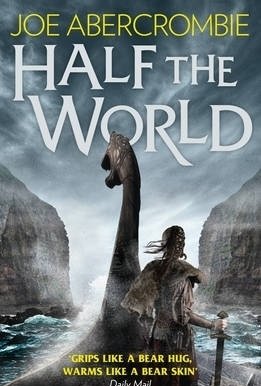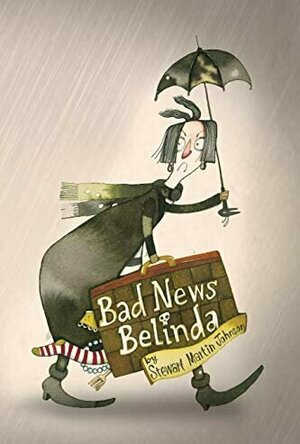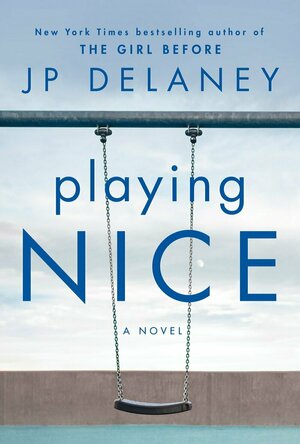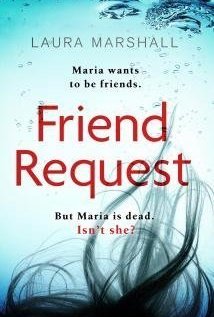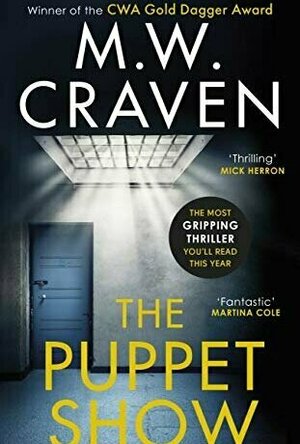Search
Search results
Phil Leader (619 KP) rated Half the World in Books
Nov 14, 2019
Father Yarvi has a problem. He is minister for Gettland but the High King is determined to engineer a war to remove Gettland from the map. Yarvi needs allies but with half the world swearing allegiance to the High King they may be in short supply.
Brand has a problem. He wants to be a warrior and do good. But he finds that doing good does not always go down well with other people.
Thorn is a problem. She wants to be a warrior like her father, but in Gettland women don't fight and despite her abilities with a sword she is seen as an embarrassment. When an accident in training happens it seems like the perfect excuse to get rid of her once and for all.
This is the second book of a young adult trilogy set in the Shattered Sea. Told from the point of view of both Thorn and Brand as they journey across half the world with Father Yarvi in search of allies this is also a journey of discovery for the two of them as they find out who they really are and what they really stand for.
As would be expected from Abercrombie the journey they undertake is fairly brutal involving physical hardship, battles and meetings with dangerous and powerful rulers. The crew of the boat start off as a rough bunch of (mostly) strangers but bonds are forged between them. As usual characterisaton is excellent and the development of both Thorn and Brand in their different ways is very well done. Abercrombie really does have a magic touch in providing characters that do not fit into the usual rough and tough warrior mould. Each has their own story and their own personality. As usual the female characters are easily as strong as the male ones; Abercrombie is an equal opportunity employer of characters.
I was worried that the ending would use the oldest fantasy trope in the book but I needn't have been concerned. The author is an old hand at setting up expectations on standard epic fantasy lines and then suddenly twisting them a different way and he does that a number of times in this novel.
Sterling work, gritty and harsh as always with that wonderful touch of dark humour from the characters and with a story that drives along leaving the reader guessing all the way.
Rating: Lots of fight scenes, a couple of non-explicit sexual scenes and some scatalogical swearing from the the saltier characters but still suitable for a 'young adult' (or indeed adult) reader.
Brand has a problem. He wants to be a warrior and do good. But he finds that doing good does not always go down well with other people.
Thorn is a problem. She wants to be a warrior like her father, but in Gettland women don't fight and despite her abilities with a sword she is seen as an embarrassment. When an accident in training happens it seems like the perfect excuse to get rid of her once and for all.
This is the second book of a young adult trilogy set in the Shattered Sea. Told from the point of view of both Thorn and Brand as they journey across half the world with Father Yarvi in search of allies this is also a journey of discovery for the two of them as they find out who they really are and what they really stand for.
As would be expected from Abercrombie the journey they undertake is fairly brutal involving physical hardship, battles and meetings with dangerous and powerful rulers. The crew of the boat start off as a rough bunch of (mostly) strangers but bonds are forged between them. As usual characterisaton is excellent and the development of both Thorn and Brand in their different ways is very well done. Abercrombie really does have a magic touch in providing characters that do not fit into the usual rough and tough warrior mould. Each has their own story and their own personality. As usual the female characters are easily as strong as the male ones; Abercrombie is an equal opportunity employer of characters.
I was worried that the ending would use the oldest fantasy trope in the book but I needn't have been concerned. The author is an old hand at setting up expectations on standard epic fantasy lines and then suddenly twisting them a different way and he does that a number of times in this novel.
Sterling work, gritty and harsh as always with that wonderful touch of dark humour from the characters and with a story that drives along leaving the reader guessing all the way.
Rating: Lots of fight scenes, a couple of non-explicit sexual scenes and some scatalogical swearing from the the saltier characters but still suitable for a 'young adult' (or indeed adult) reader.
Phillip McSween (751 KP) rated Zombieland: Double Tap (2019) in Movies
Jan 17, 2020
Implausibility Can't Stop This Fun Movie
The gang from the original are back to deal with new issues and square off against new zombies. Definitely not as good as the first, Zombieland: Double Tap packs enough of an entertaining punch to be worth your while.
Acting: 10
Beginning: 10
Characters: 8
Cinematography/Visuals: 7
Conflict: 10
Between the group’s personal issues and loads beyond loads of zombies, the movie definitely isn’t short of conflict. The film wins ultimately with the originality and variety of the zombie kills. The action is fun and, although lighthearted at times, it keeps you engaged in the movie.
Entertainment Value: 8
There was some implausibility here that made it a challenge at times to enjoy the movie. I also felt like the movie spent more time than needed trying to “chase a ghost” rather than just stand out and be its own thing. In spite of those shortcomings, man was this movie fun to watch!
Memorability: 5
Its been-there-done-that feel keeps this movie out of the classics range. There are quite a few bright spots, but nothing that made me say, “I want to watch this again right now!” Good? Absolutely. Memorable? Meh…
Pace: 10
A quick adventure that moves at a solid clip. I was never bored at any point. In fact, I had to pee extremely bad at one point and was pissed (pun intended) I had to get up. Not surprising, I missed a pretty important part of the movie. Damn you, Alamo Drafthouse, for having bathrooms so far away! What I’m saying is, the story’s flow was extremely smooth.
Plot: 2
The story is so weak it’s maddening at times. I swear, if it wasn’t such an insanely fun movie to watch, I wouldn’t have scored it nearly as high. I say maddening because the first film had so many layers to it while this one seems content on being mediocre in story.
Resolution: 10
Fun ending with a great payoff. If you’re a fan of the original, make sure not to leave right away as the credits are coming up. Cracked me up for sure!
Overall: 80
Despite a plot as strong as Jello, Zombieland: Double Tap will entertain you if you allow yourself a suspension of disbelief. The fun characters and consistent action are enough to carry the movie as a whole. Not as good as the first, but certainly not the first sequel to suffer from that issue. I recommend!
Acting: 10
Beginning: 10
Characters: 8
Cinematography/Visuals: 7
Conflict: 10
Between the group’s personal issues and loads beyond loads of zombies, the movie definitely isn’t short of conflict. The film wins ultimately with the originality and variety of the zombie kills. The action is fun and, although lighthearted at times, it keeps you engaged in the movie.
Entertainment Value: 8
There was some implausibility here that made it a challenge at times to enjoy the movie. I also felt like the movie spent more time than needed trying to “chase a ghost” rather than just stand out and be its own thing. In spite of those shortcomings, man was this movie fun to watch!
Memorability: 5
Its been-there-done-that feel keeps this movie out of the classics range. There are quite a few bright spots, but nothing that made me say, “I want to watch this again right now!” Good? Absolutely. Memorable? Meh…
Pace: 10
A quick adventure that moves at a solid clip. I was never bored at any point. In fact, I had to pee extremely bad at one point and was pissed (pun intended) I had to get up. Not surprising, I missed a pretty important part of the movie. Damn you, Alamo Drafthouse, for having bathrooms so far away! What I’m saying is, the story’s flow was extremely smooth.
Plot: 2
The story is so weak it’s maddening at times. I swear, if it wasn’t such an insanely fun movie to watch, I wouldn’t have scored it nearly as high. I say maddening because the first film had so many layers to it while this one seems content on being mediocre in story.
Resolution: 10
Fun ending with a great payoff. If you’re a fan of the original, make sure not to leave right away as the credits are coming up. Cracked me up for sure!
Overall: 80
Despite a plot as strong as Jello, Zombieland: Double Tap will entertain you if you allow yourself a suspension of disbelief. The fun characters and consistent action are enough to carry the movie as a whole. Not as good as the first, but certainly not the first sequel to suffer from that issue. I recommend!
Night Reader Reviews (683 KP) rated Bad News Belinda in Books
Jan 9, 2020
Bad News Belinda by Stewart Martin Johnson is an amazingly cute little childrens book of only about thirty pages or so. Each page only has an average of about one sentence which makes it a very easy read. For some reason, it brought back memories of Amelia Bedelia from my childhood, but that may just be because of the name.
Aunt Belinda coming to stay for a visit is one of those visits that we all come to dread. In some way, most people can probably relate to having a relative that they are less than enthusiastic to see but hopefully they are not as bad as Belinda. When Belinda is around the children have to hide their candy and clean while Belinda either sits around or makes a mess of things.
Belinda doesn't do fun things with the children like the other aunts do, instead, she makes things miserable for them. The other Aunts help the children plan to get rid of Belinda, but Belinda overhears them. After everyone tells Belinda what they really think of her she leaves on her own and the children have a party with the good aunts.
What I liked best was how the artwork and the story worked very well together. For childrens books, I feel it is very important that the artwork and the story work together. This book is a wonderful example of that. When Belinda is around the coloring is darker, messy, and has a negative feeling, but it is bright, happy, and cheerful when she is gone. If I had to choose something that I didnt like it would be how everyone told Belinda they did not like her. However, seeing as how Belinda being a problem was kind of the whole point of the book it's not really a negative.
The target readers for this book are any children who like to be read to and young beginning readers. As an adult I also found this book to be fun and enjoyed reading it to my children. That being said I rate this book to be a perfect 4 out of 4. This is because everything about this book is great. The short sentences and overall length do not intimidate young readers. The artwork is spot on with the tones of the book. It has some funny and silly moments such as Belinda eating a goldfish and some very nice rhymes.
https://nightreaderreviews.blogspot.com/
https://www.austinmacauley.com/book/bad-news-belinda
Aunt Belinda coming to stay for a visit is one of those visits that we all come to dread. In some way, most people can probably relate to having a relative that they are less than enthusiastic to see but hopefully they are not as bad as Belinda. When Belinda is around the children have to hide their candy and clean while Belinda either sits around or makes a mess of things.
Belinda doesn't do fun things with the children like the other aunts do, instead, she makes things miserable for them. The other Aunts help the children plan to get rid of Belinda, but Belinda overhears them. After everyone tells Belinda what they really think of her she leaves on her own and the children have a party with the good aunts.
What I liked best was how the artwork and the story worked very well together. For childrens books, I feel it is very important that the artwork and the story work together. This book is a wonderful example of that. When Belinda is around the coloring is darker, messy, and has a negative feeling, but it is bright, happy, and cheerful when she is gone. If I had to choose something that I didnt like it would be how everyone told Belinda they did not like her. However, seeing as how Belinda being a problem was kind of the whole point of the book it's not really a negative.
The target readers for this book are any children who like to be read to and young beginning readers. As an adult I also found this book to be fun and enjoyed reading it to my children. That being said I rate this book to be a perfect 4 out of 4. This is because everything about this book is great. The short sentences and overall length do not intimidate young readers. The artwork is spot on with the tones of the book. It has some funny and silly moments such as Belinda eating a goldfish and some very nice rhymes.
https://nightreaderreviews.blogspot.com/
https://www.austinmacauley.com/book/bad-news-belinda
Gareth von Kallenbach (980 KP) rated J. Edgar (2011) in Movies
Aug 7, 2019
When I first heard about this movie, it intrigued me. When I heard that it starred Leonardo Dicaprio and was directed by Clint Eastwood, I was hooked. And I must say, that with a few small exceptions, the film definitely lived up to expectations for me.
J. Edgar is the story of Hoover’s rise to “power”, as told by J. Edgar Hoover. The movie takes place during three different time periods: when Hoover was just a budding employee of the Department of Justice and his involvement in the creation of the Bureau of Investigation; flash forward to Kennedy’s time in the office of the President of the United States of America, and finally during Nixon’s short-lived administration.
Throughout the film we see the influence that Hoover had in the government at the time. Of course, at the beginning of his career, he had very little. But through lies, deceit and manipulation he quickly became very influential. He began building his “personal files” very early on, which he used to blackmail and coerce government officials into many things, but most of all to keep his position as head of the FBI.
Throughout the film we see J. Edgar Hoover’s struggle with his controlling mother, his sexuality and his political opponents. His mother, Annie Hoover, played by Dame Judi Dench, saw Hoover as the savior of their family name. It had been disgraced in her eyes by his mentally ill father. She was his guiding voice in all areas of his life, including appearance, stature and his sexuality.
We see Hoover make advances towards Helen Gandy, played by Naomi Watts, who is a typist who becomes his personal assistant his entire life. Hoover’s demeanor around her is awkward at best, and she makes it very clear that she is focusing on her career. Shortly after the creation of the Bureau of Investigations he meets Clyde Tolson, played by Armie Hammer of The Social Network fame. It quickly becomes obvious that there is chemistry between these two.
The film takes us all the way to Hoover’s death and the many things he has accomplished, or perhaps did not accomplish, in between. Remember that I said that this a story of J. Edgar Hoover as told by the man himself. This plays into the film in a very great way. Overall, this is definitely a must-see film as it is a great drama sprinkled with spots of humor. I can see a trio of Oscar nominations with this film for Clint Eastwood in directing, and for Leonardo Dicaprio and Armie Hammer in acting.
J. Edgar is the story of Hoover’s rise to “power”, as told by J. Edgar Hoover. The movie takes place during three different time periods: when Hoover was just a budding employee of the Department of Justice and his involvement in the creation of the Bureau of Investigation; flash forward to Kennedy’s time in the office of the President of the United States of America, and finally during Nixon’s short-lived administration.
Throughout the film we see the influence that Hoover had in the government at the time. Of course, at the beginning of his career, he had very little. But through lies, deceit and manipulation he quickly became very influential. He began building his “personal files” very early on, which he used to blackmail and coerce government officials into many things, but most of all to keep his position as head of the FBI.
Throughout the film we see J. Edgar Hoover’s struggle with his controlling mother, his sexuality and his political opponents. His mother, Annie Hoover, played by Dame Judi Dench, saw Hoover as the savior of their family name. It had been disgraced in her eyes by his mentally ill father. She was his guiding voice in all areas of his life, including appearance, stature and his sexuality.
We see Hoover make advances towards Helen Gandy, played by Naomi Watts, who is a typist who becomes his personal assistant his entire life. Hoover’s demeanor around her is awkward at best, and she makes it very clear that she is focusing on her career. Shortly after the creation of the Bureau of Investigations he meets Clyde Tolson, played by Armie Hammer of The Social Network fame. It quickly becomes obvious that there is chemistry between these two.
The film takes us all the way to Hoover’s death and the many things he has accomplished, or perhaps did not accomplish, in between. Remember that I said that this a story of J. Edgar Hoover as told by the man himself. This plays into the film in a very great way. Overall, this is definitely a must-see film as it is a great drama sprinkled with spots of humor. I can see a trio of Oscar nominations with this film for Clint Eastwood in directing, and for Leonardo Dicaprio and Armie Hammer in acting.

Vivekananda - Amar Chitra Katha Comics
Book and Entertainment
App
** Download our "India comics" App - ***Includes FREE ACK AND DIAMOND COMICS. link:...
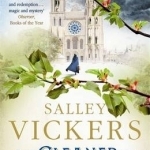
The Cleaner of Chartres
Book
'A lovely book ...wise at heart and filled with colourful characters' Joanne Harris, author of...
BookInspector (124 KP) rated Playing Nice in Books
Nov 9, 2020
The protagonists in this story were Pete and Maddie, and the story is told from their perspectives. Pete is unemployed/freelance journalist, who loves being the main carer of his son – Theo. Pete is very sweet and a true people pleaser. Maddie is working in advertising and has difficulty finding her motherly instinct when it comes to Theo. We also have Miles and Lucy, the real Theo’s parents, that are truly strange. The only character I really liked was Pete, he is just so sweet and innocent man. I did not like Maddie, I think she is an absolute hypocrite. However, I have to admit, her input in this book was intriguing. The author is an absolute expert when it comes to creating psychopaths in his novels. Every single book has one, and they are really well developed and delivered. In this book it was Miles. I really have nothing good to say about him at all, except that he is a master of deceit and nastiness.
The plot of this novel started pretty slow. It was a pity to see Pete struggling so much, but when the cruel twists came through, my blood just boiled for all the injustice happening in this book. It was like an avalanche of bad news hitting Pete and Maddie, and all that made me sad, angry and kind of annoyed. The topics discussed in this book were premature babies, mental health issues, infidelity, controlling and psychopathic partners and their behaviour, the legal system in the UK, family courts, challenging of “stay at home dad” stigma, and many more. I really liked how the author released the important information in this novel, some of it was thrown in like a bomb, but other important details were shared slowly throughout the book.
I really like the writing style, it is very well researched, truly personal and a challenging read. The book is set in London, and I really enjoy learning about different boroughs. The chapters are pretty short, and the book is so riveting and emotionally absorbing, that the pages just flew by to me. I really liked the ending of this book, it is very surprising but extremely satisfying, to say the least. 🙂
So, to conclude, I strongly recommend this novel to everyone who loves a good psychological thriller. I would love to see this book made into a film. The characters are all so different, unique and intriguing, and the plot is exceptionally well crafted, filled with so many emotions, that it is really hard to read this book without feeling something (in my case it was anger and pity).
The plot of this novel started pretty slow. It was a pity to see Pete struggling so much, but when the cruel twists came through, my blood just boiled for all the injustice happening in this book. It was like an avalanche of bad news hitting Pete and Maddie, and all that made me sad, angry and kind of annoyed. The topics discussed in this book were premature babies, mental health issues, infidelity, controlling and psychopathic partners and their behaviour, the legal system in the UK, family courts, challenging of “stay at home dad” stigma, and many more. I really liked how the author released the important information in this novel, some of it was thrown in like a bomb, but other important details were shared slowly throughout the book.
I really like the writing style, it is very well researched, truly personal and a challenging read. The book is set in London, and I really enjoy learning about different boroughs. The chapters are pretty short, and the book is so riveting and emotionally absorbing, that the pages just flew by to me. I really liked the ending of this book, it is very surprising but extremely satisfying, to say the least. 🙂
So, to conclude, I strongly recommend this novel to everyone who loves a good psychological thriller. I would love to see this book made into a film. The characters are all so different, unique and intriguing, and the plot is exceptionally well crafted, filled with so many emotions, that it is really hard to read this book without feeling something (in my case it was anger and pity).
BookInspector (124 KP) rated Friend Request in Books
Sep 24, 2020
I got kind of sucked in from the first pages of this book. It started quite idyllic, a single mother with her little boy. The pressure slowly building up after Louise receives the friend request, and it continues throughout the whole book.
Our main character is, of course, Louise, even though she had a tough divorce which broke her, she got her life together and is a successful businesswoman. Throughout the book, we meet a lot of unique characters, not only from her present but from the past as well. I really liked Louise as a character, she proved to me, that people are able to change.
The narrative, that is the part of this book which I really loved. It is told from a single perspective, but the plot is very well crafted and filled with a lot of feelings, emotions and fantastic twists and turns. It is pretty hard to describe it without spoilers, but let’s try. I do have to mention, that this novel is about bullying, drugs and its consequences to peoples lives. Louise has done something really bad when she was at school, and that thing is haunting her 25 years later. The author does not leave it to this disappearance of Maria only, she spices it up with a ton of twists and illusions. I should say that Laura is a master for creating an illusion.
The plot was time travelling between the present and 1989, revealing the events that took place little by little, and creating even more suspense and wish to find out more. One thing that really annoyed me was that the author exaggerated the character’s secrets, and when you expect something grand and you receive a very uninteresting surprise, it kind of left me disappointed. :/ Another thing what really annoyed me, the way drug use was portrayed in this book. I think drug use is a serious issue, and shouldn’t be portrayed as “cool” or as a “not a big deal”, especially when it comes to school kids.
This was a very well thought through novel, with easy language and overall great writing style. I liked the not-too-long, not-too-short chapters, and I think that the ending of this book was incredibly unexpected, and rounded this story really nicely. So, to conclude, I do strongly recommend this compelling and chilling book, filled with incredible story, unexpected turns, and things which are not as they seem to be. I hope you will enjoy it as much as I did.
Our main character is, of course, Louise, even though she had a tough divorce which broke her, she got her life together and is a successful businesswoman. Throughout the book, we meet a lot of unique characters, not only from her present but from the past as well. I really liked Louise as a character, she proved to me, that people are able to change.
The narrative, that is the part of this book which I really loved. It is told from a single perspective, but the plot is very well crafted and filled with a lot of feelings, emotions and fantastic twists and turns. It is pretty hard to describe it without spoilers, but let’s try. I do have to mention, that this novel is about bullying, drugs and its consequences to peoples lives. Louise has done something really bad when she was at school, and that thing is haunting her 25 years later. The author does not leave it to this disappearance of Maria only, she spices it up with a ton of twists and illusions. I should say that Laura is a master for creating an illusion.
The plot was time travelling between the present and 1989, revealing the events that took place little by little, and creating even more suspense and wish to find out more. One thing that really annoyed me was that the author exaggerated the character’s secrets, and when you expect something grand and you receive a very uninteresting surprise, it kind of left me disappointed. :/ Another thing what really annoyed me, the way drug use was portrayed in this book. I think drug use is a serious issue, and shouldn’t be portrayed as “cool” or as a “not a big deal”, especially when it comes to school kids.
This was a very well thought through novel, with easy language and overall great writing style. I liked the not-too-long, not-too-short chapters, and I think that the ending of this book was incredibly unexpected, and rounded this story really nicely. So, to conclude, I do strongly recommend this compelling and chilling book, filled with incredible story, unexpected turns, and things which are not as they seem to be. I hope you will enjoy it as much as I did.
BookInspector (124 KP) rated The Puppet Show (Washington Poe, #1) in Books
Sep 24, 2020
Tilly and Poe are an absolutely stunning combo. They are total opposites in everything: age, the way they work, IQ levels, but they make such an amazing team together. I really liked Poe and his personality, he has a great analytical mind and strong determination to achieve justice. However, Tilly was my favourite in this book, she is such a unique and original character! She is full of surprises, and her intelligence and naivety are incredibly refreshing. I really liked the way the author portrayed the different relationships between police personnel, all the politics and territorial fights were very amusing to read about, and gave the sense, that the author really knows what he is talking about. His work experience in the police and life in the Lake District was very well utilized in this book.
The narrative was very creatively written. The excitement in this book comes in waves, we have these calm periods, when it seems that not many things happen, and then the author throws in some great twist or turn, and the whole buzz comes back rushing. I really liked the topics which the author discussed in this book, such as workplace bullying, child abuse, politics in the management, etc. The story was told from a single perspective, bringing in a lot of Poe’s personal emotions. Even though it was sufficient to me, I would love to see how Tilly’s brain works and how she is processing different situations.
The setting of the book is constantly changing between different places in Cumbria, and the detailed descriptions made me feel like I am with Poe on this journey. The writing style was very pleasant with short chapters, which really just flew by. I have to add a little warning, this novel does carry some scenes where people might feel disturbed. The ending was very cleverly written, where it rounded the whole story very well, but at the same time, leaving you questioning of what is going to happen next.
To conclude, I think it is a very intriguing and absorbing thriller, filled with very unique but at the same time believable characters, and the plot, that keeps thickening as you go, engrossing you with all the new findings and leads. It was a true page-turner to me and I can not wait for the second book in the series. If you haven’t read it, please do, I think it is worth the time, and I hope you will enjoy it as much as I did.
The narrative was very creatively written. The excitement in this book comes in waves, we have these calm periods, when it seems that not many things happen, and then the author throws in some great twist or turn, and the whole buzz comes back rushing. I really liked the topics which the author discussed in this book, such as workplace bullying, child abuse, politics in the management, etc. The story was told from a single perspective, bringing in a lot of Poe’s personal emotions. Even though it was sufficient to me, I would love to see how Tilly’s brain works and how she is processing different situations.
The setting of the book is constantly changing between different places in Cumbria, and the detailed descriptions made me feel like I am with Poe on this journey. The writing style was very pleasant with short chapters, which really just flew by. I have to add a little warning, this novel does carry some scenes where people might feel disturbed. The ending was very cleverly written, where it rounded the whole story very well, but at the same time, leaving you questioning of what is going to happen next.
To conclude, I think it is a very intriguing and absorbing thriller, filled with very unique but at the same time believable characters, and the plot, that keeps thickening as you go, engrossing you with all the new findings and leads. It was a true page-turner to me and I can not wait for the second book in the series. If you haven’t read it, please do, I think it is worth the time, and I hope you will enjoy it as much as I did.

King of Dragon Pass
Games and Entertainment
App
Create your own epic saga of conflict, mythology, and community! This acclaimed game of magical...
